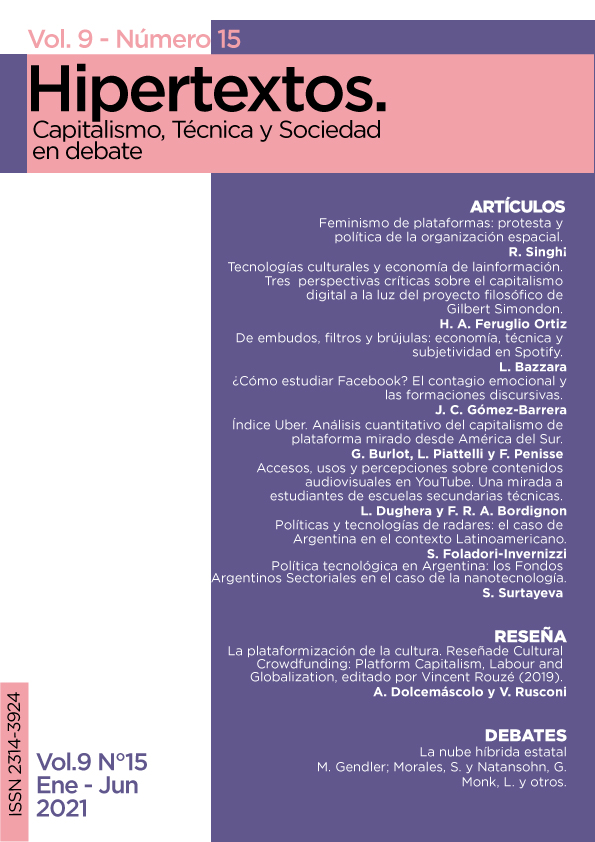Feminismo de plataformas: protesta y política de la organización espacial
DOI:
https://doi.org/10.24215/23143924e026Palabras clave:
activismos feministas, plataformas de medios, políticas, organización espacialResumen
Este artículo pone en cuestión la utilidad política de las plataformas como medio para la resistencia feminista. A partir de ejemplos como el #MeToo, y la Marcha de Mujeres en Washington, movimientos que se apoyaron en las plataformas para revitalizar lo que Sarah Banet-Weiser ha denominado “feminismo popular” (2018), argumento que las plataformas mediáticas tienden a asumir determinadas ideas de seguridad, privilegio y poder en relación con el espacio social. Destacando cómo las personas negras, indígenas y de color (BIPOC, en inglés) se organizan en el espacio social, señalo que el foco en la amplificación y la elevación, facilitado por la lógica de la plataforma, vela las necesidades de quienes resisten desde los márgenes. Introduzco las estrategias espaciales utilizadas por quienes deben negociar el espacio de manera distinta para desafiar la centralidad de las plataformas como medio estructurante de las luchas feministas contemporáneas.
Descargas
Citas
Baer, H. (2010). Redoing Feminism: Digital Activism, Body Politics, and Neoliberalism. Feminist Media Studies 16.1, p.17-34.
Banet-Weiser, S. (2018). Popular Feminism: #metoo. LA Book of Reviews.
Battersby, S. J. (2016, 2 de abril). Inside Toronto’s Black Lives Matter Camp.
The Toronto Star, https://www.thestar.com/news/gta/2016/04/03/inside-torontos-black-lives-mattercamp.Html
Bratton, B. H. (2015). The Stack: on Software and Sovereignty. MIT Press.
Brock, A. (2012). From the Blackhand Side: Twitter as a Cultural Conversation. Journal of Broadcasting and Electronic Media, 56:4, p.529-549.
Daniels, J. (2015). The Trouble with White Feminism: Whiteness, Digital Feminism and the Intersectional Internet, En Noble, S.U. and Tynes, B.M (eds), The Intersectional Internet: Race, Sex, Class and Culture Online. New York: Peter Lang Publishing.
Feigennbaum, A. (2014). Resistance Matters: Tents, Tear Gas and the ‘Other Media’ of Occupy. Communication and Critical/ Cultural Studies. 11-1, p.15-24.
Gajalla, R. (2012). Cyberculture and the Subaltern: Weavings of the Virtual and Real. Lexington Press.
Hands, J. (2013). Platform Communism. Culture Machine, 14, p. 1-24.
Hedge, R. S. (2011). Circuits of Visibility: Gender and Transnational Media Cultures. NYU Press.
Keller, J. (2012). Virtual Feminisms. Information, Communication & Society 15.3, p.429-47.
Kino-nda-niimi Collective (2104). The Winter We Danced: Voices from the Past, the Future, and the Idle No More Movement. Manitoba: ARP Books.
Langois, G. y Elmer, G. (2013). The Research Politics of Social Media Platforms. Culture Machine. Vol.14, p.1-17.
McLuhan, M. (1964). Understanding media. London: Sphere Books.
McPherson, T. (2014). Designing for Difference. Differences: A Journal of Feminist Cultural Studies, 25:1, p. 177-188.
Moss, P. y Maddrell, A. (2017). Emergent and divergent spaces in the Women’s March: the
challenges of intersectionality and inclusion. Gender, Place & Culture, 24:5.
Noble, S. U. y Tynes, B. M. (2015). The Intersectional Internet: Race, Sex, Class and Culture Online. New York: Peter Lang Publishing.
Packer, J. y Crofts Wiley, S. B. (2012). Communiction Matters: Materialist Approaches to Media, Mobility and Networks. Routledge.
Puar, J. (2015). Queer Times, Queer Assemblages. Social Text, 23, p.121–139.
Puar, J. (2011). ‘I would rather be a cyborg than a goddess’ Intersectionality, Assemblage, and Affective Politics. European Institute for Progressive Cultural Policies (Transversal: inventions).
Rentschler, C. (2015). #Safetytipsforladies: Feminist Twitter Takedowns of Victim Blaming. Feminist Media Studies 15.2, pp. 353-356.
Rottenberg, C. (2013, 13 de diciembre). Can #MeToo Go Beyond White Neoliberalism? Aljazeera http://www.aljazeera.com/indepth/opinion/metoo-white-neoliberal-feminism-171213064156855.html
Sharma, S. (2008). Taxis as Media: A Temporal Materialist Reading of the Taxicab. Social Identities: Journal of Race, Nation, and Culture, 14.4, p.457-464.
Srnicek, N. (2016). Platform Capitalism. Cambridge: Polity.
Sullivan, A. (2018, 12 de enero). It’s Time to Resist the Excesses of #MeToo. NY Mag. http://nymag.com/daily/intelligencer/2018/01/andrew-sullivan-time-to-resist-excesses-of-metoo.html
Taylor, A. (2014). The People’s Platform: Taking Back Power and Culture in the Digital Age. New York: Metropolitan Books.
Willoughby, V. (2017, 23 de enero). Signs At the Women’s March on Washington Called out White Feminism. Teen Vogue, https://www.teenvogue.com/story/signs-at-the-womens-march-on-washington-called-out-white-feminism

























